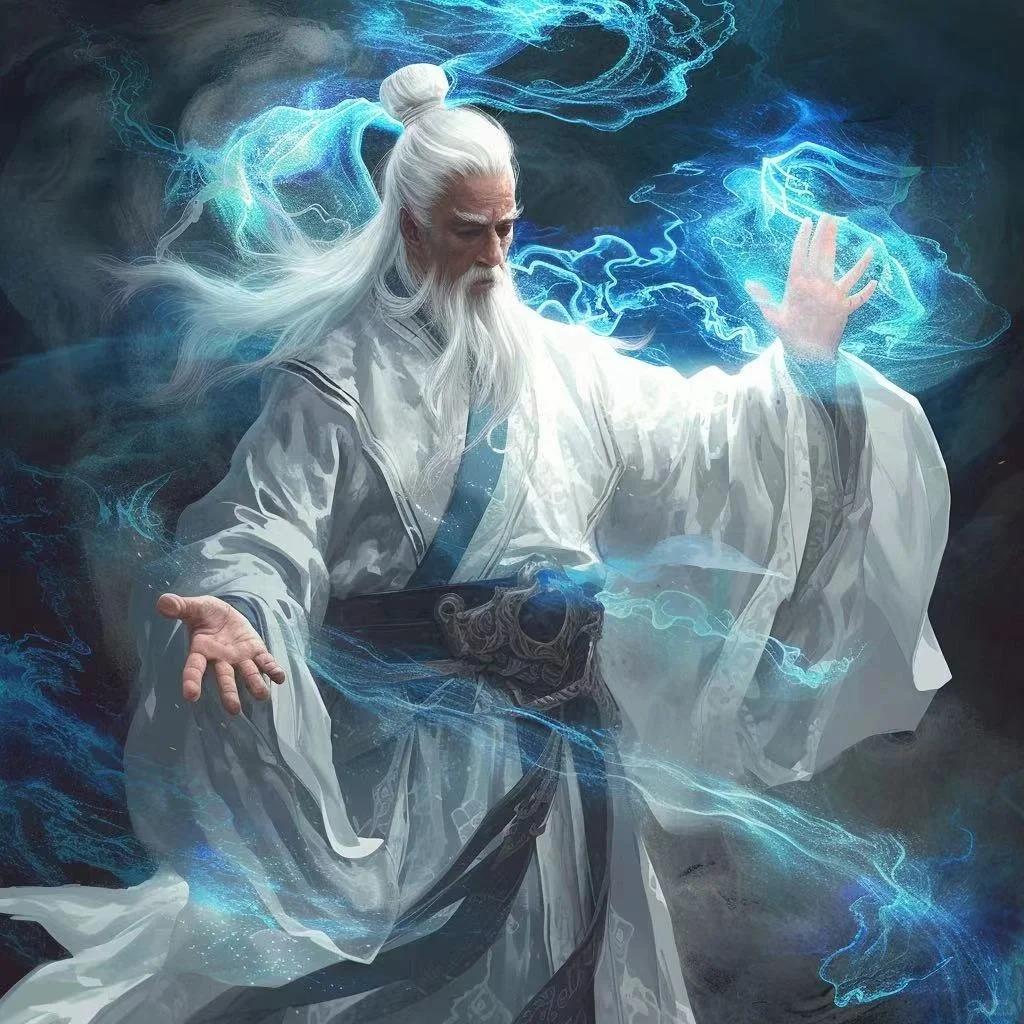In the ancient mountains of the south, where the clouds clung to the peaks and the forests whispered with the sounds of hidden spirits, there lived a renowned feng shui master named Zhang Yi. For many years, Zhang Yi had lived in solitude, deep in meditation and study, seeking the profound truths of Daoism and its application to the harmony of the world. He was a master of feng shui, the ancient Chinese art of arranging one's environment to promote balance, prosperity, and health, which was deeply rooted in Daoist principles of energy, or "Qi" (气), and the natural forces of the universe.
Zhang Yi was no ordinary feng shui practitioner; his understanding of the Dao ran deep, and he had unlocked the true essence of Daoist wind and water—principles that transcended mere material concerns and aligned the soul with the flow of cosmic energies. He understood that every object in the universe, every plant, stone, and even the placement of buildings, could influence the balance of Qi, which in turn would affect the fortunes of those who inhabited the space.
One day, after many years of study and practice, Zhang Yi received a letter from a wealthy merchant named Liu Zhang, who lived in a bustling city at the foot of the mountains. Liu Zhang had recently purchased a new house, a large and luxurious estate, and sought Zhang Yi’s expertise to arrange the feng shui of his home. The merchant was a successful businessman, but he felt that something was missing in his life—his business, though prosperous, lacked a sense of peace and balance. The atmosphere in his home was tense, and despite his wealth, he often felt restless and unfulfilled.
Liu Zhang wrote:
"Master Zhang, I have heard of your unparalleled wisdom in feng shui. My new house is grand, but I cannot shake the feeling that something is wrong. The air feels heavy, and my family is unsettled. I ask for your guidance to bring balance to my home, so that peace and prosperity may flourish within it."
Upon receiving the letter, Zhang Yi set out to visit Liu Zhang’s estate. As he approached the house, the sight of its towering gates and intricate architecture did little to ease his sense of unease. The house, while magnificent, stood isolated—its energy seemed blocked, as though it could not properly channel the natural Qi that the land had to offer. Zhang Yi knew that in order to bring true harmony to the space, he would need to align the energy of the house with the forces of nature.
Upon entering the home, Zhang Yi walked slowly through the rooms, his senses attuned to the environment. He noticed how the walls were adorned with expensive tapestries, the furniture elegant, yet the atmosphere felt disconnected. The energy of the house felt stagnant, as if trapped within its opulence. Zhang Yi’s gaze fell upon Liu Zhang, who stood nervously by his side.
“Master Zhang,” Liu Zhang said with a hint of desperation in his voice, “I have followed every suggestion I could find on the internet and from other feng shui consultants, but nothing has brought peace to my family. What is it that we are missing?”
Zhang Yi smiled gently, his expression calm, and replied, “You have focused on material objects and physical arrangements, but the true essence of feng shui lies in the spiritual harmony of the space. It is not the objects themselves that hold the power, but the energy they carry and how they interact with the surrounding Qi. I will show you the way.”
Zhang Yi then reached into his bag and pulled out a small, carefully wrapped item—a smooth, jade stone, rich in a deep emerald green. The stone shimmered faintly in the light, its surface polished to a mirror-like sheen. This was no ordinary jade; it was a piece of high-quality, translucent jade known for its calming properties, often used in Daoist practices to balance the energies of a space. Zhang Yi had chosen this jade not only for its beauty but for its deep resonance with the natural world.
“Jade,” Zhang Yi explained, “is not only a precious stone. In Daoism, jade symbolizes harmony, vitality, and purity. It holds the power to harmonize the flow of Qi, smooth out any disharmony in the environment, and bring vitality to the surroundings. By placing this jade in your home, you will be inviting the natural energies to restore balance.”
Liu Zhang watched in awe as Zhang Yi carefully placed the jade stone in the center of the living room, positioned where the natural light could fall upon it each day. The stone’s vibrant green hue seemed to glow softly as if it were alive with energy. Zhang Yi then instructed Liu Zhang to place the stone in other key locations around the house—near the main entrance to attract positive energy, in the kitchen to nourish the family, and in the master bedroom to ensure peaceful rest.
“The placement of objects in harmony with the flow of Qi is critical,” Zhang Yi continued. “But the jade itself will act as a stabilizing force, ensuring that no negative energy lingers within your home. The jade will also help you and your family attune to the natural rhythms of the universe. By aligning your space with the natural order, your mind and heart will find peace, and your energy will be rejuvenated.”
With these instructions, Zhang Yi left Liu Zhang’s home, confident that the energy of the house had already begun to shift. As he walked away, he could sense the subtle change in the environment, as though the entire space had inhaled a deep, cleansing breath.
Days passed, and Liu Zhang began to notice profound changes in his home. The heavy feeling that had once pervaded the rooms had lifted. His family felt more at ease, and their relationships had become warmer and more harmonious. The once-stale atmosphere was now infused with a sense of calm and vitality. Liu Zhang himself began to feel more centered and focused. The jade stone, placed in the right positions, seemed to work its magic, clearing the air of stagnant energy and inviting fresh vitality into the home.
Soon, Liu Zhang noticed that his business had begun to flourish as well. He found himself making more profitable deals, and his reputation as a businessman grew. He attributed much of this success to the newfound harmony in his home, which had brought clarity and peace to his mind. His family was happier, and their well-being was improving.
Grateful for Zhang Yi’s guidance, Liu Zhang made a promise to himself: every year, he would present Zhang Yi with a piece of jade as a token of appreciation. He knew that the jade was not merely a stone but a symbol of the deep connection between the spiritual and material worlds, a reminder of the power of balance and harmony.
Each year, Liu Zhang kept his word, sending the feng shui master a new jade stone as a symbol of his gratitude. These stones were carefully selected, each one unique, reflecting the growing understanding Liu Zhang had of the deeper forces at play in his life. Over the years, the merchant's success continued to rise, but more importantly, he had found peace within himself and his family.
Daoist Wisdom Behind the Jade Feng Shui
The story of Liu Zhang and Zhang Yi beautifully illustrates the core principles of Daoism, especially the idea of balance, harmony, and the flow of Qi. In Daoist thought, everything in the universe is interconnected, and the energies of nature must be carefully balanced for human beings to live in harmony. The earth, the sky, the seasons, and even the placement of objects in our homes all influence the flow of Qi, which is the vital life force that sustains the world.
Jade, in Daoist philosophy, is more than just a material object—it is a symbol of purity, vitality, and balance. The emerald green of the jade represents growth, renewal, and the natural harmony of the world. In Daoism, jade is often used in talismans and jewelry to enhance spiritual clarity, protect against negative energy, and attract positive Qi.
The act of placing the jade stone in strategic areas of the home reflects the Daoist principle of aligning with the natural flow of the universe. By arranging the environment to support the positive flow of Qi, one can bring peace, prosperity, and vitality into their life. In this sense, feng shui is not just about arranging furniture or decorations—it is about aligning oneself with the deeper currents of nature, respecting the forces that govern the universe, and allowing those forces to guide and support us.
Zhang Yi’s use of jade as a feng shui tool demonstrates the importance of using natural materials that resonate with the energy of the universe. Just as Daoist practitioners seek to live in harmony with nature, so too should their living spaces reflect that harmony. By doing so, they create an environment that supports both their spiritual growth and their material well-being.
For Liu Zhang, the gift of jade was not merely a physical object—it was a symbol of the deeper connection between the spiritual and material worlds. His success, peace, and prosperity were not just the result of business acumen or material wealth, but the result of aligning his life with the natural flow of Qi, aided by the wisdom of Daoist feng shui.
In the end, the story of the jade and feng shui master is a reminder of the Daoist truth that true wealth and success come from balance—not just in one’s external circumstances, but in one’s heart and mind, aligned with the natural order of the universe.



